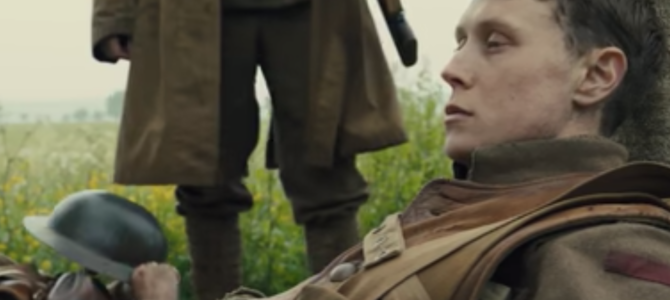
Sam Mendes’ World War I epic “1917” made its wide theatrical release right before the world began waiting on an outbreak of war between Iran and the United States due to the killing of an Iranian general, missile strikes on American bases, and the mysterious crashing of an airliner.
Although it seems World War III is out of the picture for now, “1917” is a timely portrait of both war’s trauma and its allure. It confronts us with war’s sorrow and futility, but also its transcendent appeal. Through beautiful cinematography and moving performances, it dares us to wonder if perhaps the human spirit shines brighter in war than in peace.
Without question, “1917” is a technical masterpiece in the way it’s shot and cut, showing “impossibly young Lance Corporals Blake and Schofield … navigate through booby-trapped bunkers, sniper fire, and scores of other mortal dangers,” as my colleague Ellie Bufkin explains. She continues:
‘1917’ brings emotion to a full-length narrative feature with an almost magical floating camera — a hat tip to the film’s masterful cinematographer, Roger Deakins. The real-time effect Deakins creates brings to life a landscape of peril and death as the clock ticks on a mission that seems destined to fail.
Along with the brilliant cinematography and writing by “Penny Dreadful” alum Krysty Wilson-Cairns, George MacKay’s stellar performance as Lance Cpl. William Schofield brings the film to life.
War Makes Us More than Who We Are
MacKay looks like most English boys did as they marched off to war in 1914. Despite being 27, MacKay is positively fresh-faced and youthful; he looks like a boy who has yet to taste either great joy or pain.
But by the end of the movie, MacKay’s character wears the pain of the ages on his face. Through his soulful performance, the audience can feel everything Schofield does. We see him gather all his will to endure as he battles a sniper, knowing that 1,600 men will die if he cannot transcend his pain at this moment. We feel his relief and rejuvenation as he drifts down a river, covered in a delicate shower of cherry blossoms. Then once again, his horror and revulsion as he must cross a dam of bloated, blue corpses in the river — all so he can carry on his impossible task.
One of the movie’s greatest triumphs is that it doesn’t pitch you on how horrible World War I was. Instead, it simply tells the story of ordinary men, who for a moment became something more than what peacetime would ever allow them to be.
Perhaps that is one of the most intoxicating aspects of war, or at least what we imagine war to be, and “1917” shows it brilliantly: The transformation of nobodies to grand actors on the world stage, playing out the will of the infinite. Weak, pitiful creatures made of dust, for the briefest of moments, get to be the movers and shakers of all eternity, fighting for something greater than themselves.
War Corrupts Us, but So Does Peace
One beautiful scene of the movie shows a chance encounter with Schofield and a young Belgian woman. She is terrified; he is wounded and weary. They are both trying to care for an orphaned baby whose name and mother they don’t even know.
Although the audience does not envy their fear, hunger, or exhaustion, the comfort Will feels as a girl presses her apron against his wounds is a satisfaction more profound than what most of us will ever experience. After all, who could perceive a feather’s weight of comfort when we are smothered by comfort every day?
Maybe it’s not about war and peace as much as it is hunger and satiety. Even with greater material comfort and luxury than all societies before us, our hearts are still sick. As medicine, technology, and abundant food are raising our life expectancies, overdoses and suicides are bringing them down. We may not envy Schofield his misery, but we should envy his hope.
Only fools long for war. War isn’t as glorious as many of us movie-watchers wish it to be. Ask the men and women who return from war addicted to the rush and violence, or the trauma-stricken veteran.
The question is whether those who’ve felt war can know something sweeter and deeper than those who’ve only known peace. The pressure of war makes us more human, for good and for evil. It’s the refiner’s fire that shows us who we really are. “1917” puts a mirror up to the face of humanity and reminds us why we should never go to war — and why we always will.









